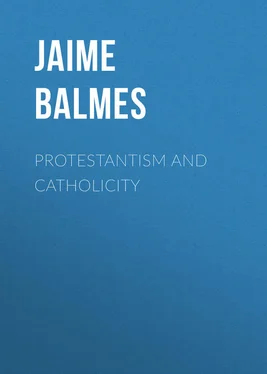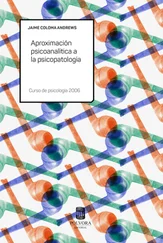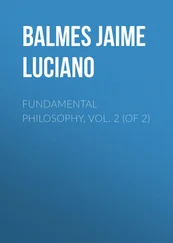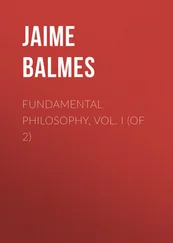Jaime Balmes - Protestantism and Catholicity
Здесь есть возможность читать онлайн «Jaime Balmes - Protestantism and Catholicity» — ознакомительный отрывок электронной книги совершенно бесплатно, а после прочтения отрывка купить полную версию. В некоторых случаях можно слушать аудио, скачать через торрент в формате fb2 и присутствует краткое содержание. Жанр: foreign_antique, foreign_prose, на английском языке. Описание произведения, (предисловие) а так же отзывы посетителей доступны на портале библиотеки ЛибКат.
- Название:Protestantism and Catholicity
- Автор:
- Жанр:
- Год:неизвестен
- ISBN:нет данных
- Рейтинг книги:3 / 5. Голосов: 1
-
Избранное:Добавить в избранное
- Отзывы:
-
Ваша оценка:
- 60
- 1
- 2
- 3
- 4
- 5
Protestantism and Catholicity: краткое содержание, описание и аннотация
Предлагаем к чтению аннотацию, описание, краткое содержание или предисловие (зависит от того, что написал сам автор книги «Protestantism and Catholicity»). Если вы не нашли необходимую информацию о книге — напишите в комментариях, мы постараемся отыскать её.
Protestantism and Catholicity — читать онлайн ознакомительный отрывок
Ниже представлен текст книги, разбитый по страницам. Система сохранения места последней прочитанной страницы, позволяет с удобством читать онлайн бесплатно книгу «Protestantism and Catholicity», без необходимости каждый раз заново искать на чём Вы остановились. Поставьте закладку, и сможете в любой момент перейти на страницу, на которой закончили чтение.
Интервал:
Закладка:
It is not easy, then, to imagine why M. Guizot exclusively attributes to the barbarians the pleasure of feeling themselves men, the feeling of personality, of human spontaneousness in its free development . Can we believe that such sentiments were unknown to the victors of Marathon and Platæa, to those nations who have immortalized their names by so many monuments? When, in the fine arts, in the sciences, in eloquence, in poetry, the noblest traits of genius shone forth on all sides, had they not among them the pleasure of feeling themselves men, the feeling and the power of the free development of all their faculties? and in a society where glory was so passionately loved, as we see it was among the Romans, in a society which shows us men like Cicero and Virgil, and which produced a Tacitus, who still, after nineteen centuries, makes every generous heart thrill with emotion, was there no pleasure in feeling themselves men, no pride in appreciating their own dignity? Was there no feeling of the spontaneousness of man in his own free development? How can we imagine that the barbarians of the north surpassed the Greeks and Romans in this respect? Why, then, these paradoxes, this confusion of ideas? Of what avail are these brilliant expressions meaning nothing? Of what use are these observations, of a false delicacy, where the mind at first sight discovers vagueness and inexactitude; and where it finds, after a complete examination, nothing but incoherency and revery?
CHAPTER XXII.
HOW THE INDIVIDUAL WAS ABSORBED BY ANCIENT SOCIETY
IF we profoundly study this question, without suffering ourselves to be led into error and extravagance, by the desire of passing for deep observers; if we call to our aid a just and cool philosophy, supported by the facts of history, we shall see that the principal difference between the ancient civilizations and our own with respect to the individual is, that, in antiquity, man, considered as man, was not properly esteemed . Ancient nations did not want either the feeling of personal independence, or the pleasure of feeling themselves men ; the fault was not in the heart, but in the head. What they wanted was the comprehension of the dignity of man; the high idea which Christianity has given us of ourselves, while, at the same time, with admirable wisdom, it has shown us our infirmities. What ancient societies wanted, what all those, where Christianity does not prevail, have wanted, and will continue to want, is the respect and the consideration which surround every individual, every man, inasmuch as he is a man . Among the Greeks the Greeks are every thing; strangers, barbarians, are nothing: in Rome, the title of Roman citizen makes the man; he who wants this is nothing. In Christian countries, the infant who is born deformed, or deprived of some member, excites compassion, and becomes an object of the tenderest solicitude; it is enough that he is man, and unfortunate. Among the ancients, this human being was regarded as useless and contemptible; in certain cities, as for example at Lacedæmon, it was forbidden to nourish him, and, by command of the magistrates charged with the regulation of births, horrible to relate! he was thrown into a ditch. He was a human being ; but what matter? He was a human being who would be of no use; and society, without compassion, did not wish to undertake the charge of his support. If you read Plato and Aristotle, you will see the horrible doctrine which they professed on the subject of abortion and infanticide; you will see the means which these philosophers imagined, in order to prevent the excess of population; and you will be sensible of the immense progress which society has made, under the influence of Christianity, in all that relates to man. Are not the public games, those horrible scenes where hundreds of men were slaughtered to amuse an inhuman multitude, an eloquent testimony to the little value attached to man, when he was sacrificed with so much barbarism for reasons so frivolous?
The right of the strongest was exercised among the ancients in a horrible manner; and this is one of the causes to which must be attributed the state of annihilation, so to speak, in which we see the individual with respect to society. Society was strong, the individual was weak; society absorbed the individual, and arrogated to itself all imaginable rights over him; and if ever he made opposition to society, he was sure to be crushed by it with an iron hand. When we read the explanation which M. Guizot gives us of this peculiarity of ancient civilizations, we might suppose that there existed among them a patriotism unknown to us; a patriotism which, carried to exaggeration, and stripped of the feeling of personal independence, produced a kind of annihilation of the individual in presence of society. If he had reflected deeply on the matter, M. Guizot would have seen that the difference is not in the feelings of antiquity, but in the immense fundamental revolution which has taken place in ideas; hence he would easily have concluded, that the difference observed in their feelings must have been owing to the differences in the ideas themselves. Indeed, it is not strange that the individual, seeing the little esteem in which he was held, and the unlimited power which society arrogated to itself over his independence and his life, (for it went so far as to grind him to powder, when he opposed it,) on his side formed an exaggerated idea of society and the public authority, so as to annihilate himself in his own heart before this fearful colossus. Far from considering himself as a member of an association the object of which was the safety and happiness of every individual, the benefits of which required from him some sacrifices in return, he regarded himself as a thing devoted to this association, and compelled, without hesitation, to offer himself as a holocaust on its altars. Such is the condition of man; when a power acts upon him, for a long time, unlimitedly, his indignation is excited against it, and he rejects it with violence; or else he humbles, he debases, he annihilates himself before the strong influence which binds and prostrates him. Let us see if this be not the contrast which ancient societies constantly afford us; the blindest submission and annihilation on the one hand, and, on the other, the spirit of insubordination, of resistance, showing itself in terrible explosions. It is thus, and thus only, that it is possible to understand how societies, whose normal condition was confusion and agitation, present us with such astonishing examples as Leonidas with his three hundred Spartans perishing at Thermopylæ, Sævola thrusting his hand into the fire, Regulus returning to Carthage to suffer and die, and Marcus Curtius, all armed, leaping into the chasm which had opened in the midst of Rome. All these phenomena, which at first sight appear inexplicable, are explained when we compare them with what has taken place in the revolutions of modern times. Terrible revolutions have thrown some nations into confusion; the struggle of ideas and interests, inflaming their passions, has made them forget their true social relations, during intervals of greater or less duration. What has happened? At the same time that unlimited freedom was proclaimed, and the rights of individuals were incessantly extolled, there arose in the midst of society a cruel power, which, concentrating in its own hands all public authority, inflicted on them the severest blows. At such periods, when the formidable maxim of the ancients, the salus populi , that pretext for so many frightful attempts was in full force, there arose, on the other hand, that mad and ferocious patriotism which superficial men admire in the citizens of ancient republics.
Some writers have lavished eulogiums on the ancients, and, above all, on the Romans. It seemed as if, to gratify their ardent wishes, modern civilization must be moulded according to the ancient. They made absurd attempts; they attacked the existing social system with unexampled violence; they labored to destroy, or at least to stifle, Christian ideas concerning the individual and society, and they sought their inspiration from the shades of the ancient Romans. It is remarkable that, during the short time that the attempt lasted, there were seen, as in ancient Rome, admirable traits of strength, of valor, of patriotism, in fearful contrast with cruelties and crimes without example. In the midst of a great and generous nation there appeared again, to affright the human race, the bloody spectres of Marius and Sylla; so true it is that man is everywhere the same, and that the same order of ideas in the end produces the same order of events. Let the Christian ideas disappear, let old ones regain their force, and you will see that the modern world will resemble the ancient one. Happily for humanity, this is impossible. All the attempts hitherto made to produce such a result have been necessarily of short continuance, and such will be the case in future. But the bloody page which these criminal attempts have left in history offers an abundant subject for reflection to the philosopher who desires to become thoroughly acquainted with the intimate and delicate relations between ideas and facts. There he will see fully exhibited the vast scheme of social organization, and he will be able to appreciate at its just value the beneficial or injurious influence of the various religious and the different philosophical systems.
Читать дальшеИнтервал:
Закладка:
Похожие книги на «Protestantism and Catholicity»
Представляем Вашему вниманию похожие книги на «Protestantism and Catholicity» списком для выбора. Мы отобрали схожую по названию и смыслу литературу в надежде предоставить читателям больше вариантов отыскать новые, интересные, ещё непрочитанные произведения.
Обсуждение, отзывы о книге «Protestantism and Catholicity» и просто собственные мнения читателей. Оставьте ваши комментарии, напишите, что Вы думаете о произведении, его смысле или главных героях. Укажите что конкретно понравилось, а что нет, и почему Вы так считаете.












